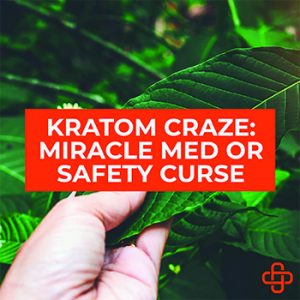 Touted as a natural supplement that combats fatigue, improves work productivity, while relieving pain and providing a legalized “high”, the Kratom craze continues to immerge!
Touted as a natural supplement that combats fatigue, improves work productivity, while relieving pain and providing a legalized “high”, the Kratom craze continues to immerge!
But what do we actually know about this supplement? And could the substance pose a threat to the workplace in terms of maintaining a safe environment?
What is Kratom?
Kratom is a mind-altering substance extracted from the leaves of Mitragyna speciosa, a tropical evergreen tree. Found mainly in the humid jungles of Southeast Asia, the leaves are chewed, brewed or crushed into a green powder. The chemicals in the herb interact with different types of receptors in the brain — some that respond to opioids, and others to stimulants. Often sold in the United States in a processed form — like pills, capsules or extracts — a small amount of kratom can perk you up, while larger doses have sedating effects.
The supplement can be found in vitamin stores, gas stations or paraphernalia/smoke shops.
While presently legal at the federal level, several states have banned the sale of the product.
Dangerous Side Effects
Though further research is required to better understand the associated benefits and/or risks associated with the supplement, experts are sharing anecdotal evidence of both dangerous side effects and addictive tendencies.
Side effects of high-dose kratom use include:
- Tachycardia
- Dizziness
- Hypotension
- Dehydration
- Constipation
- Tremors
- Weight gain
- Seizures
- Psychotic symptoms of mental confusion, delusions, and hallucinations
In addition, users who experience physical withdrawals when attempting to discontinue use are reporting:
- Weight loss
- Decreased libido
- Insomnia
- Muscle spasms
- Aching muscles/bones
- Jerky movements of the limbs
- Watery eyes/nose
- Flushed skin
- Decreased appetite
- Diarrhea
Workplace Considerations
Despite its legality at the federal level, the U.S. Food and Drug Administration is warning consumers not to use the product. There are no FDA-approved uses for kratom, and the agency has received concerning reports about the safety of kratom.
Employers should consider educating staff as to the dangers associated with the product, especially for those working in safety-sensitive roles.
While kratom detection is not included in standard drug testing panels, there are some kratom alkaloids that can be detectable with urine or blood tests, such as the kratom 10 urine drug screen panel.










